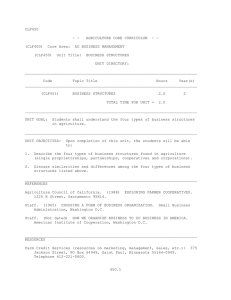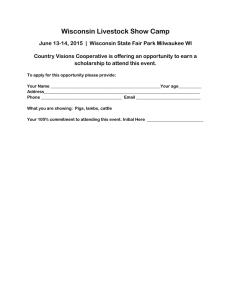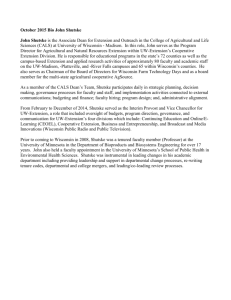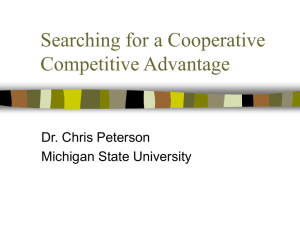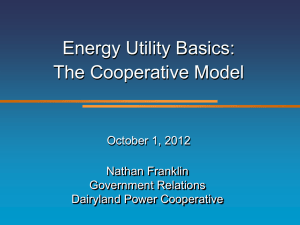Bill Oemichen
advertisement
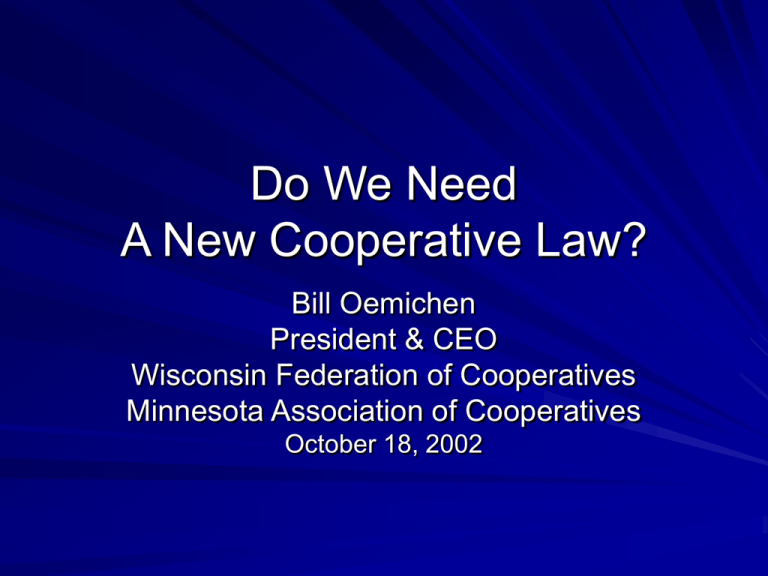
Do We Need A New Cooperative Law? Bill Oemichen President & CEO Wisconsin Federation of Cooperatives Minnesota Association of Cooperatives October 18, 2002 A New Minnesota/Wisconsin Cooperative Law? Problems in the Cooperative World – Difficult preferred stock offerings – Declining cooperative formation and registration Wisconsin - In 2001, 22 new cooperatives registered out of 21,892 new entities Minnesota - similar results A New Minnesota/Wisconsin Cooperative Law? Minnesota and Wisconsin Cooperatives are facing difficulties in obtaining financing for new value-added ventures when they have less than 40% equity Minnesota and Wisconsin laws limit cooperatives to no more than 8% dividends Cooperatives have difficulty retiring member equity A New Minnesota/Wisconsin Cooperative Law? Minnesota and Wisconsin cooperatives are exploring creation of an additional cooperative law similar to the new Wyoming law In July 2002, six meetings were held across Minnesota with more than 65 cooperatives Research/member feedback process continues; several trends are clear A New Minnesota/Wisconsin Cooperative Law? Cooperative Membership – Wyoming law allows patron and investment members – Cooperatives recognize the difficulty of obtaining outside equity through preferred non-voting stock – Cooperatives have concerns when coupled with financial rights A New Minnesota/Wisconsin Cooperative Law? Financial Rights – Wyoming law provides for allocations and distributions on the basis of patronage for patron members and investment for investment members – Wyoming law provides for at least 15% of allocations and distributions going to patron members, regardless of ownership level A New Minnesota/Wisconsin Cooperative Law? Financial Rights – Cooperatives agree there must be a minimum protection for patron members – The question is whether 15% is sufficient to “protect” patron members Some argue the minimum threshold should be higher by statute Others argue the issue should be left to the cooperative’s bylaws A New Minnesota/Wisconsin Cooperative Law? Financial Rights – Some cooperatives are concerned about the type of investor that would be allowed Should Xcel be allowed to purchase shares in an electric cooperative? Shouldn’t the focus be on other cooperatives as investors and local business persons who have a stake in local economic development? Doesn’t an investor from “elsewhere” potentially have a different investment motivation? A New Minnesota/Wisconsin Cooperative Law? Board of Directors – Wyoming law provides for at least three (3) members; at least one director must be elected by the patron members and the patron members must have at least 50% of the voting control – Significant issue for cooperatives because of perceived potential problems A New Minnesota/Wisconsin Cooperative Law? – Some are concerned there may be a “knowledge” imbalance between patron board members and investment board members – Some are interested in defining who may serve on the board and require annual meeting attendance of all board directors – There is substantial interest in requiring more than one patron board member and more than 51% voting control A New Minnesota/Wisconsin Cooperative Law? Board of Directors – Substantial agreement, however, that outside directors are desirable – Some want the board of directors issue to be left to cooperative bylaws rather than state statute – Some want the proposed statute to be very specific on the board makeup A New Minnesota/Wisconsin Cooperative Law? Capper-Volstead Antitrust Protection – Generally not an issue that was raised by many cooperatives, partly because of the diversity of the cooperatives attending the Minnesota meetings – More than several agreed with the idea that antitrust protection means little if the cooperative cannot obtain financing A New Minnesota/Wisconsin Cooperative Law? Co-op Securities Exemption – Minnesota, and Wisconsin to a lesser degree, exempt Section 521 cooperatives from state securities law – Same with 1933 Securities and Exchange Act – “Wyoming Co-op” appears to be able to utilize the same exemptions A New Minnesota/Wisconsin Securities Law? Financing – Eligibility concern for Minnesota and Wisconsin cooperatives CoBank – – – – 80% producer control One member one vote 10% limitation on dividends Would CoBank seek a change in regulations to allow lending to new “Wyoming Co-op” style cooperatives? A New Minnesota/Wisconsin Cooperative Law? Financing – Eligibility concern for Minnesota and Wisconsin cooperatives Cenex Finance Association – Must be a “local” co-op (owned and controlled by members) – One member - one vote – Would CFA change its requirements to allow lending to new “Wyoming Co-op” style cooperatives? A New Minnesota/Wisconsin Cooperative Law? Financing – If CoBank and CFA financing isn’t available to “Wyoming-style” cooperatives, there still is financing available from the Farm Credit System A New Minnesota/Wisconsin Cooperative Law? Taxation – Goal is to ensure taxation at the patron level, not cooperative level – “Wyoming Cooperative” appears to be eligible for Subchapter K or T taxation Under Subchapter K, “Wyoming cooperative” treated like a partnership with taxation at the patron member level rather than at the entity level This is seen as a positive for cooperatives A New Minnesota/Wisconsin Cooperative Law? Philosophical issues: – Compared to an LLC, “cooperative” better describes the efforts that existing cooperatives, agricultural producers, and residents of rural communities are taking for rural economic development and greater self-sufficiency – When does a cooperative become a “cooperative in name only”? – Expanding the number of participants increases the potential base or purchasers – Is it time to further evolve cooperatives? A New Minnesota/Wisconsin Cooperative Law? Participant Consensus in Minnesota – Move forward with a new, additional cooperative law (Minn. Stat. Chapter 308b), where: There are adequate safeguards for patron members and board directors The new cooperative must not be a “cooperative in name only”
